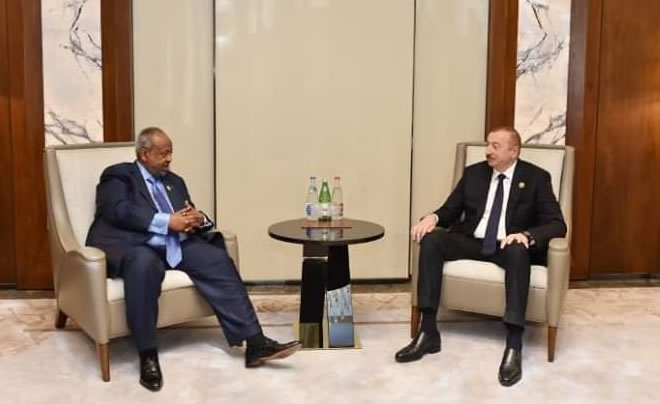
Eliud Kibii
Monday October 28, 2019

Djibouti President President Ismail Omar Guelleh and his Azerbaijan counterpart Illham Aliyev hold talks on the sidelines the 18th Summit of Heads of State and Government of the Non-Aligned Movement in Baku, Indonesia
Image: COURTESY
Despite Kenya securing Africa Union’s endorsement as a candidate for the UN Security Council non-permanent seat for the 2021-22 tenure, Djibouti is not relenting on its candidature.
The rivalry played out at the just-concluded 18th Summit of Heads of State and Government of the Non-Aligned Movement.
The organisation is the largest after the UN, with 120 member states and 17 observer nations.
Djibouti has disputed Kenya's endorsement and intensified her campaign, which is understood to enjoy the backing of the Francophone nations and the Muslim world.
The tussle by the two Horn of Africa countries sets the scene for a grandstand finish in June 2020 when the UN General Assembly is scheduled to take the vote.
President Uhuru Kenyatta, who was attending the inaugural Russia-Africa Summit, was represented by Foreign Affairs CAS Ababu Namwamba.
Ababu in his address on Saturday lobbied for Kenya, highlighting the country’s pedigree in anchoring multilateralism and promoting peace and security regionally and globally.
Djibouti also lobbied for its candidature through President Ismail Omar Guelleh's address to the NAM Summit.
“We understand Djibouti had dedicated offices specifically for lobbying delegations to the Baku Summit that closes this weekend,” Ababu said from Baku.
Ababu also secured the support of Cuba, Kazakhstan and Belarus. He also sought backing from the republics of Guatemala, Iraq and Azerbaijan, among other states whose representatives he spoke to.
Djibouti’s President also held talks with his Azerbaijan counterpart and discussed “the importance of cooperation and mutual support between the two countries in international organisations”.
Outgoing chairman President Nicholas Maduro of Venezuela and his successor President Ilham Aliyev of Azerbaijan, opened the Summit.
Presidents Abdelkader Bensalah (Algeria), Hassan Ruhani (Iran), Miguel Diaz Canel (Cuba), Hage Gottfried Gein (Namibia), Nana Afufo-Addo (Ghana), Arif Alvi of Pakistan, Ashraf Ghani (Afghanistan), Gurbanguly Berdimuhamedow (Turkmenistan) attended the meeting.
Others were Obiang Nguema Mbasongo (Equatorial Guinea), King Mswati III of Eswatini (formerly Swaziland), and Malaysia's Prime Minister Mahathir Mohamed.
Kenya is relying on a 10-point agenda to campaign for the UNSC seat.
They are building bridges, peacekeeping and support operations, regional peace and security, counterterrorism, women peace and security, youth empowerment, humanitarian action, justice, human rights and democracy and environment and climate change.
In his address to UNGA in September, President Kenyatta said Kenya deserves the seat because of its leading role in regional peace and stability in Eastern Africa as well as the Horn Africa, and it’s contribution of troops to UN peacekeeping operations across the world.
“When the world had given up on our region, we opened our doors to millions of people fleeing insecurity. To this day, we host hundreds of thousands of refugees. Our investment in the Sudan negotiations led to the Comprehensive Peace Agreement in 2005. We continue to support stabilisation efforts in both Sudan and South Sudan,” Uhuru said.